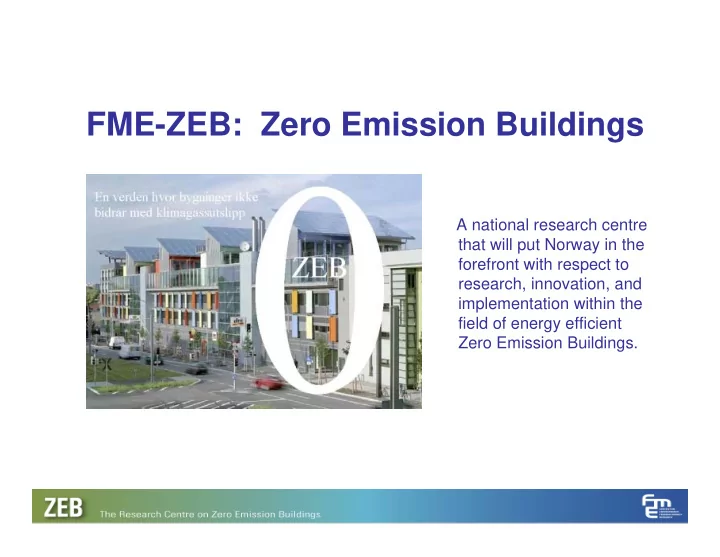

FME-ZEB: Zero Emission Buildings A national research centre that will put Norway in the forefront with respect to research, innovation, and implementation within the field of energy efficient Zero Emission Buildings.
FME-ZEB: Zero Emission Buildings In February 2009, the Research Council of Norway assigned The Faculty of Architecture and Fine Art at NTNU to host one of eight new national Centres for Environment- friendly Energy Research (FME): Zero Emission Buildings (ZEB). Duration: 2009 – 2016 Budget: approximately 38 mill Euro (300 mill NOK)
The Research Centres for Environment- friendly Energy Research (FMEs): � Norwegian Centre for Offshore Wind Energy (CMR) � BIGCCS Centre – International CCS Research Centre (SINTEF Energy) � Subsurface CO2 storage – Critical Elements and Superior Strategy (CMR) � Research Centre for Offshore Wind Technology (SINTEF Energiforskning) � Centre for Environmental Design of Renewable Energy (SINTEF Energiforskning) � The Norwegian Research Centre for Solar Cell Technology (IFE) � Bioenergy Innovation Centre (UMB) � The Research Centre on Zero Emission Buildings (NTNU)
The objective of ZEB: The main objective of ZEB is to develop competitive products and solutions for existing and new buildings that will lead to market penetration of buildings with zero greenhouse gas emissions related to their production, operation, and demolition. The centre will encompass both residential, commercial, and public buildings.
The challenge: Energy standard, single family houses in Norway Annually energy demand/production: kWh/m2 250 Compensate for CO 2 200 emissions from the 150 production of materials and construction by 100 producing more energy 50 than the building uses for 0 operation. -50 -100 Today's Buildings Passive Net zero Plus energy average code, 2007 house energy standard standard Energy demand Energy production Source: SINTEF Byggforsk
Expertise in the ZEB Centre ZEB will include experts within material science, building technology, energy technology, architecture, and social science . Strong industry involvement will put focus on finding cost-effective and competitive solutions. ZEB will therefore encompass the whole value chain of market players within the Norwegian construction sector. ZEB will also cooperate with international well-known research institutions with relevant activities. The expected volume of formally trained research personnel is 15 PhD-students, 5 post-doctoral fellows and at least 50 MSc-students.
NTNU SINTEF ZEB – a national team SINTEF Energi Skanska Maxit Isola � Glava University and research institutions Protan � Producers of materials and Hydro Aluminium products for the building industry YIT DuPont � Contractors, consultants, Multiconsult architects Brødrene Dahl � Snøhetta Trade organizations ByBo � Public administration Forsvarsbygg � Statsbygg Property managers Husbanken � Users Byggenæringens landsforening Norsk Teknologi Statens Byggetekniske Etat
Other institutions cooperating with ZEB: International partners: The reference group: � � VTT (Finland) Lavenergiprogrammet � � Chalmers (Sweden) NBBL � � Fraunhofer (Germany) NVE � � TNO (The Netherlands) Forbrukerrådet � � LBL (USA) EcoBox � � MIT (USA) Driftsforum � � University of Strathclyde (Scotland) Enova � Tsinghua University (China) In addition, we are actively involved in a number of IEA projects within the SHC and ECBCS programmes (Tasks 40, 41, 42,…, Annex 53,..), as well as in a number of EU and Nordic research projects.
The ZEB research activities ZEB will focus its work in five areas that interact and influence each other: – WP-1: Advanced materials technologies – WP-2: Climate-adapted low-energy envelope technologies – WP-3: Energy supply systems and services – WP-4: Use, operation, and implementation – WP-5: Concepts and strategies
WP1 - Advanced material technologies Main goal: Development of new and innovative materials and solutions, as well as improvements of the current state-of-the-art technologies Subtasks: - 1.1: New concepts - 1.2: Opaque and transparent solutions - 1.3: Controllable materials and solutions - 1.4: Energy storage solutions - 1.5: Energy converting materials and solutions
WP2 – Climate adapted, low energy envelope technologies Main goal: Develop climate adapted, verified, and cost effective solutions for new and existing building envelopes (roofs, walls and floors) that will give the least possible heat loss and at the same time a reduced need for cooling. Subtasks: - 2.1: Optimal thermal performance - 2.2: Integration of active elements in the building envelope - 2.3: Daylight and solar shading systems - 2.4: Development of windows and glazing systems
WP3 - Energy Supply Systems and Services Main goal: Develop new solutions for energy supply systems and building services systems with reasonable energy and indoor environment performance appropriate for zero emission buildings. Subtasks: - 3.1: Available technologies for renewable energy - 3.2: Interaction between user needs, energy supply, and building services - 3.3: Integration of technologies and solutions Source: University Wuppertal, School - 3.4: High performance building services of Architecture, Building Physics and Technical Building Services. - 3.5: Test and pilot buildings - Follow up Prof. Karsten Voss
WP4 - Use, operation, and implementation Main goal: Provide knowledge and tools which assure usability and acceptance, maintainability and efficiency, and implementation of ZEBs. Subtasks: - 4.1: Use - 4.2: Operation - 4.3: Implementation
WP5 - Concepts and strategies for ZEBs Main goal: Develop concrete concepts for zero emission buildings which can be translated into realized pilot buildings within the time frame of the Centre. Subtasks: - 5.1: Definitions of ZEBs - 5.2: ZEB concepts - 5.3: Pilot buildings - 5.4: Strategies and building processes
The ZEB Research Centre Management: Director: Professor Anne Grete Hestnes, NTNU Manager: Research director Terje Jacobsen, SINTEF Byggforsk Work Package Leaders: WP1: Professor Arild Gustavsen, NTNU WP2: Research manager Berit Time, SINTEF WP3: Professor Vojislav Novakovic, NTNU WP4: Associate professor Thomas Berker, NTNU WP5: Senior researcher Tor Helge Dokka, SINTEF EU contact: Professor Øyvind Aschehoug, NTNU
Recommend
More recommend